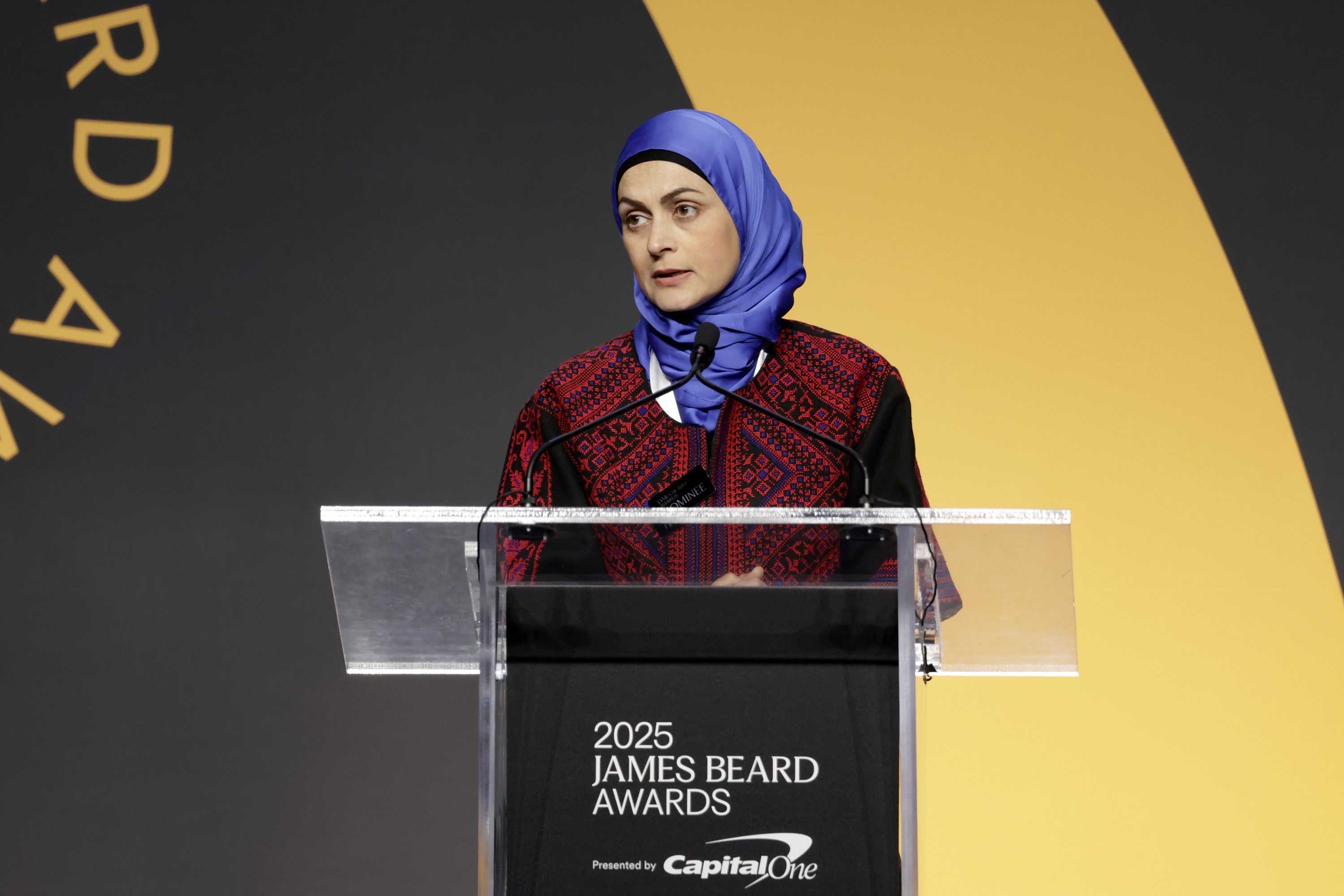© Turkuvaz Haberleşme ve Yayıncılık 2026
This year’s James Beard Awards spotlighted a truth often overlooked in the haze of war and politics: Food, like poetry, is resistance. Among the winners were two Palestinians – Musab Abu Toha, the poet whose verses echo from the rubble of Gaza and Laila El-Haddad, the culinary writer whose recipes and reflections document what remains when all else is destroyed.
In her award-winning essay, "A Cuisine Under Siege," published in Saveur, El-Haddad mourns the loss of her beloved aunt Um Hani, killed in an Israeli airstrike in November 2023. But she also reclaims her aunt’s legacy – built not through speeches or slogans, but through sumagiyya, a traditional Gazan lamb dish, Swiss chard, chickpeas and tart sumac.
“In Gaza,” she writes, “sumagiyya is synonymous with weddings, family gatherings and Eid al-Fitr. Its presence speaks not only of celebration but of survival.”
Food in her writing is not merely nourishment – it is an archive, a code of memory and a quiet but powerful act of defiance. El-Haddad shows that culture cannot be flattened by tanks or erased by drones: “Israel’s checkpoints, separation walls and roadblocks may have physically separated our families, but they could not eradicate our culture.”
Yet food is not only a vessel of memory but also a battleground.
Palestinian cuisine, like the land itself, has been a target of Israeli occupation not just politically, but culturally. Dishes such as hummus, falafel and musakhan have often been rebranded in global culinary discourse as “Israeli,” while symbolic foods like olives and za’atar – directly tied to Palestinian soil – have been stripped of their origins. The systematic uprooting and destruction of olive trees by Israeli occupation forces is not just ecological devastation; it is a calculated erasure of Palestinian heritage and sustenance.
This form of appropriation and obliteration has a name: gastrocolonialism – the colonization not just of land, but of food, taste and tradition. In this light, cookbooks like "The Gaza Kitchen," co-authored by Laila El-Haddad and Maggie Schmitt, are weapons of cultural resistance, documenting recipes that anchor a people to their place and asserting rightful culinary authorship in the face of erasure.

Crucially, Israel’s claim to cultural superiority – a persistent rhetorical tool of many colonial powers – serves as a moral smokescreen for its military aggression. By positioning itself as the representative of “civilization” in the region, Israel legitimizes its actions through a narrative of modernity and progress, in contrast to what it frames as the primitiveness of the colonized. But this self-appointed supremacy has been repeatedly challenged and dismantled – not just through political resistance, but through literature, poetry, music and food.
The power of this cultural resistance reached one of the most symbolic spaces in the Global North recently, when Musab Abu Toha’s poem appeared in the London Tube, projected onto the very walls of a system designed to move millions through one of the world’s wealthiest capitals. That quiet verse – born from the rubble of a besieged neighborhood – spoke louder than any headline. It brought with it the memory of a Gaza flattened by bombs, of loved ones buried under collapsed kitchens and libraries, of lives deemed collateral.
And in that moment, a contradiction emerged, raw and unresolvable: the poet whose words graced the walls of London may not live to see them, nor might the cooks who preserved their homeland through lentils, labneh and lamb. This is the brutal paradox of Palestinian creativity: to offer the world exquisite poetry and cuisine while living under the constant threat of annihilation. The world reads, tastes, applauds, but does it protect?
Her words reminded me of a story I told in my novel "Cüda," about a Bosniak family who migrated to Palestine generations ago. Between wars and exiles, they passed down a notebook filled with recipes – not because they wanted to preserve taste, but because that notebook was the last thing that tied them to home. But it wasn’t only recipes that endured.
Alongside them were sevdalinkas, the traditional Bosnian love songs, passed from grandmother to granddaughter, quietly hummed in kitchens or whispered before sleep. These melancholic melodies, with their poetic lyrics and aching cadences, preserved not only memory but also the emotional landscape of a displaced people. Just like recipes, they are instruments of transmission – teaching not just language, but longing; not just culture, but connection. In "Cüda," both the recipes and the sevdalinkas become intertwined threads in a tapestry of memory, showing that culture is not merely stored in books or museums, but in the sounds and flavors we carry with us.
Each list of ingredients becomes a map of a lost homeland. The presence of pomegranate molasses, fresh parsley or smoked eggplants are not coincidental. These plants grow in a place we may no longer live in, but still carry in our bones. Recipes teach us not only what we ate, but how we lived, who we were and what we refused to forget.
El-Haddad and Abu Toha embody two ancient forms of resistance that Palestinians have long relied on: poetry and cuisine. In an age of digital erasure and collapsing homes, these forms endure not just as art, but as survival. “My family taught me to cook not with books or videos,” El-Haddad writes, “but by standing beside them, watching, listening, mimicking. I wasn’t just learning food – I was learning us.”
That kind of learning transcends war. And perhaps this is where hope resides – in the passing down of stories, in the sizzle of garlic in olive oil, in poems recited under candlelight.
In honoring these two writers, the James Beard Foundation didn’t just award excellence in writing. It recognized memory as a form of resistance – and Palestine, not as a fading cause, but as a living culture, defending its roots plate by plate, poem by poem, even as its creators stand at the edge of life and death.
